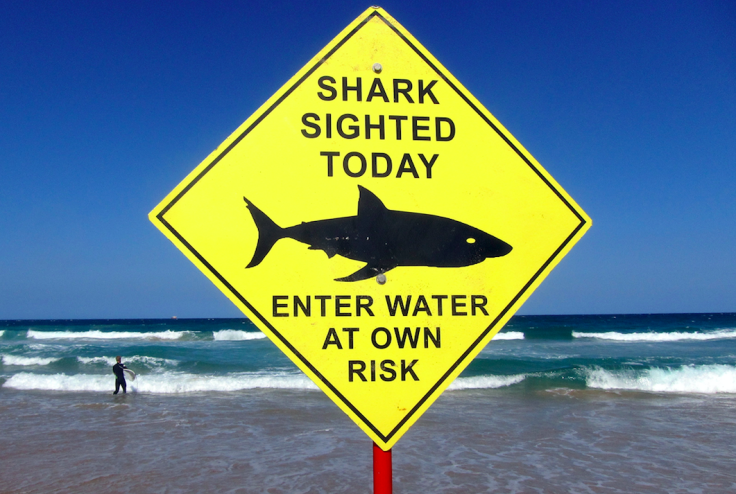'Shark's Eye View': Researchers Find Evidence For 'Mistaken Identity' Theory Behind Shark Bites
KEY POINTS
- Shark bites are rare but still prompt public concern
- The mistaken identity theory suggests sharks mistake humans for their usual prey
- Researchers compared underwater videos of humans and prey from a shark's view
Humans who surf or swim may appear much like seals in the eyes of juvenile great white sharks, a new study has found. This supports the "mistaken identity theory" of why sharks bite people.
Great white sharks, also called white sharks, along with bull sharks and tiger sharks, account for the most bites on humans, researchers from Macquarie University in Sydney, Australia noted in a news release. Juvenile sharks are said to be more dangerous to humans compared to older great white sharks, which are believed to have better vision.
Researchers of a new study, published in the Journal of The Royal Society Interface said shark bites are rare, but they still happen "sufficiently frequent" enough that it causes public concern.
The mistaken identity theory supposes that sharks mistake people in the ocean for their actual prey of pinnipeds (seals and sea lions). To test this theory, the researchers observed and compared underwater videos of swimming seals and sea-lions, rectangular floats and humans swimming in different strokes as well as paddling on different sizes of surfboards.
To have a "shark's eye view," they processed the videos to reflect how juvenile white sharks would have seen them.
The researchers found that from the visual perspective of juvenile great white sharks, the "motion cues" of the pinnipeds and the humans swimming and riding surfboards "did not differ significantly."
"The difference in shape between pinnipeds with abducted versus adducted flippers was bigger than between pinnipeds with flippers abducted and surfboards or human swimmers," the researchers wrote. "From the perspective of a white shark, therefore, neither visual motion nor shape cues allow an unequivocal visual distinction between pinnipeds and humans, supporting the mistaken identity theory behind some bites."
New shark-vision models show that many shark bites by great whites may be a case of mistaken identity, as surfing and swimming humans on the ocean’s surface closely resemble seals and sea-lions: https://t.co/4lhCqKpqEF@MQSciEng #sharkattack #marinelife #BiologicalSciences pic.twitter.com/Ska4C4fKeR
— Macquarie University (@Macquarie_Uni) October 27, 2021
According to the researchers, the results of their work provide the "first evidence" to support the mistaken identity theory from a visual perspective. Most sharks are "likely completely colorblind," Macquarie University noted, adding that their visual cues come mainly from silhouettes.
Even though sharks have other sensory means by which to receive information, evidence suggests that "visual cues alone are sufficient to trigger a predatory or exploratory approach," the researchers wrote. In fact, white sharks have been known to attack inanimate objects that resemble pinnipeds even though they do not emit olfactory or electrical cues.
Furthermore, sharks have a lower spatial resolution or see in less detail compared to humans, study lead author, surfer and post-doctoral researcher at Macquarie University, Laura Ryan, told ABC news.
"So, potentially, these older adults are more experienced, enhanced, so they might not make as many mistakes," Ryan told the outlet. "Also, as an animal grows, its eye gets bigger, and so that means that their spatial acuity gets bigger, so they are able to distinguish a bit more detail," she added.
"While it seems unlikely that every bite on a human by white sharks is a result of mistaken identity, our results suggest that in circumstances where surface objects, like surfers, are targeted by white sharks from below it is very possible," the researchers wrote.
Ryan also clarified that what they looked at are the unprovoked attacks, and not provoked ones where the sharks are acting in defense. One of the reasons they pursued the study, Ryan explained, is to help the public perception of sharks. This is because even if shark bites are rare, they can also harm tourism as well as shark populations as such incidences lead to "lethal shark mitigation measures."
"Understanding why shark bites occur can help us find ways to prevent them while keeping both humans and sharks safer," Ryan said, as per the university news release.

© Copyright IBTimes 2024. All rights reserved.





















